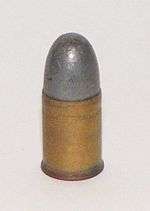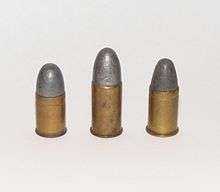.450 Adams
The .450 Adams was a British black powder centrefire revolver cartridge, initially used in converted Beaumont–Adams revolvers, in the late 1860s.[1] Officially designated .450 Boxer Mk I, and also known variously as the .450 Revolver, .450 Colt, .450 Short, .450 Corto and .450 Mark III, and in America as the .45 Webley,[2] it was the British Army's first centrefire revolver round.[2]
| .450 Adams | ||||||||||||
|---|---|---|---|---|---|---|---|---|---|---|---|---|
 .450 Adams cartridge | ||||||||||||
| Type | Revolver | |||||||||||
| Place of origin | United Kingdom | |||||||||||
| Service history | ||||||||||||
| In service | 1868-1880 | |||||||||||
| Used by | British military, North-West Mounted Police, colonial military, police forces | |||||||||||
| Production history | ||||||||||||
| Designed | 1868 | |||||||||||
| Specifications | ||||||||||||
| Bullet diameter | .455 in (11.6 mm) | |||||||||||
| Neck diameter | .475 in (12.1 mm) | |||||||||||
| Base diameter | .477 in (12.1 mm) | |||||||||||
| Rim diameter | .510 in (13.0 mm) | |||||||||||
| Case length | .69 in (18 mm) | |||||||||||
| Overall length | 1.10 in (28 mm) | |||||||||||
| Rifling twist | 1:16 | |||||||||||
| Primer type | boxer | |||||||||||
| Ballistic performance | ||||||||||||
| ||||||||||||
| Source(s): Barnes & Amber 1972 | ||||||||||||
History
The .450 was adopted for the Adams revolver in November 1868,[2] and served until it was replaced in service in 1880[2] by the .476 Enfield (in the Enfield Mark 1 and 2),[2] which was in turn supplanted by the .455 Webley cartridge in 1887.
Originally loaded with 13 grains (0.84 g) of black powder under a 225-grain (14.6 g) bullet,[2] it was later also offered in a smokeless powder loading.[2] Despite the different designations, the .450 may be fired in any weapon chambered for .455 Webley,[2][3] .455 Colt, or .476 Enfield.[4]
While not considered a suitable military round,[2] the .450 Mark III cartridges did serve in reserve for the British armed forces as late as the First World War.[2] The .450 Adams also proved popular among civilian users of Webley RIC and British Bulldog revolvers, being loaded in Europe, and persisting in the United States until around 1940. Both Colt and Smith & Wesson offered revolvers in .450 Adams.[2]
It was roughly similar in power to the contemporary .38 S&W,[5] .41 Colt,[6] and .44 S&W American.[7]
Handloaded ammunition can be made from shortened .455 Webley brass.

Notes
- Maze, Robert J. (2002). Howdah to High Power. Tucson, AZ: Excalibur Publications. ISBN 1-880677-17-2.
- Barnes, p.173, ".450 Revolver"
- Maze, Robert J. Howdah to High Power (Tucson, AZ: Excalibur Publications, 2002), p.32.
- Barnes, p.174, ".455 Revolver MK-1/.455 Colt".
- Barnes, p.163, ".38 Smith & Wesson".
- Barnes, p.165, ".41 Long Colt".
- Barnes, p.167, ".44 Smith & Wesson American".
Sources
- Barnes, Frank C., ed. by John T. Amber. ".450 Revolver", in Cartridges of the World, pp. 170 & 177. Northfield, IL: DBI Books, 1972. ISBN 0-695-80326-3.
- Barnes, Frank C., ed. by John T. Amber. ".38 Smith & Wesson", in Cartridges of the World, p. 163. Northfield, IL: DBI Books, 1972. ISBN 0-695-80326-3.
- Barnes, Frank C., ed. by John T. Amber.. ".41 Long Colt", in Cartridges of the World, p. 165. Northfield, IL: DBI Books, 1972. ISBN 0-695-80326-3.
- Barnes, Frank C., ed. by John T. Amber. ".44 Smith & Wesson American", in Cartridges of the World, p. 167. Northfield, IL: DBI Books, 1972. ISBN 0-695-80326-3.
- Barnes, Frank C., ed. by John T. Amber.. ".455 Revolver MK-1/.455 Colt", in Cartridges of the World, p. 174. Northfield, IL: DBI Books, 1972. ISBN 0-695-80326-3.
- Maze, Robert J. Howdah to High Power. Tucson, AZ: Excalibur Publications, 2002. ISBN 1-880677-17-2.
External links
| Wikimedia Commons has media related to .450 Adams. |